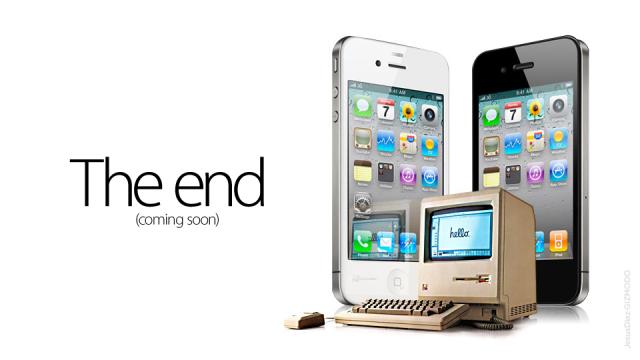The latest Mac OS X is now just OS X. The “Mac” is now gone. It’s a clear declaration of intentions. The end of Macintosh — the desktop metaphor that reigned supreme for more than two decades — is near.
Not the MacBooks and the iMacs, no, but what defines them. Their software soul. Two more years and it will be nothing but compost under the flowers of iOS.
Yes, yes, I know. “Outrage!” “Bring out the tar and the feathers!” “Burn him!”
Whatever.
The fact is that it’s happening. Apple is doing it, using an app-centric user experience model, and Microsoft is doing it too, with their information-centric Metro interface. The latter will take over Windows just like iOS is taking over OS X. Yes, Microsoft is killing the desktop metaphor it copied from Apple too.
How did this happen?
This process started when Apple realised the success of the iPhone was unstoppable. That people just loved this new way of computing that required no files, that you could touch and manipulate naturally. It continued with the iPad, which has become more than just a content-consumption platform — taking over the enterprise and breaking into many types of content creation.
And yes, I hate to tell you I told you so, but I told you so.
It’s going to continue with Mountain Lion and the new MacBook Pro 2012s.
This is not just theoretical. It’s supported by what users are demanding. You just have to look at this chart made by Asymco’s Horace Deidu. Apple sold 156 million iOS devices in one year compared to 122 million Macs in 28 years.
Think about that. Thirty million more units in one year compared to the whole, nearly three-decade history of a product. Even taking into account the obvious expansion of computing during almost three decades, the amount is staggering.
This is why Apple is making so much money. And why Microsoft is attacking back with Metro.
Their user experiences will be different, but at the core of it is a database-driven world in which the user’s data — songs, videos, documents, plans, game scores, social identities — are in a soup accessible through all their devices. For Apple users, their information is accessible from apps which are mostly isolated. For Microsoft users, there’s a single sea of information that can be navigated in many different ways. The latter is potentially more powerful than Apple’s approach, but that’s the subject for another article.
The important thing is that the Finder and the Explorer are on their way out, that the desktop metaphor is about to die. Good riddance. Because it was never designed to support the staggering amount of information that we have to deal with every day. We’ve changed. Our information has changed. The Mac, the desktop — has to die.
